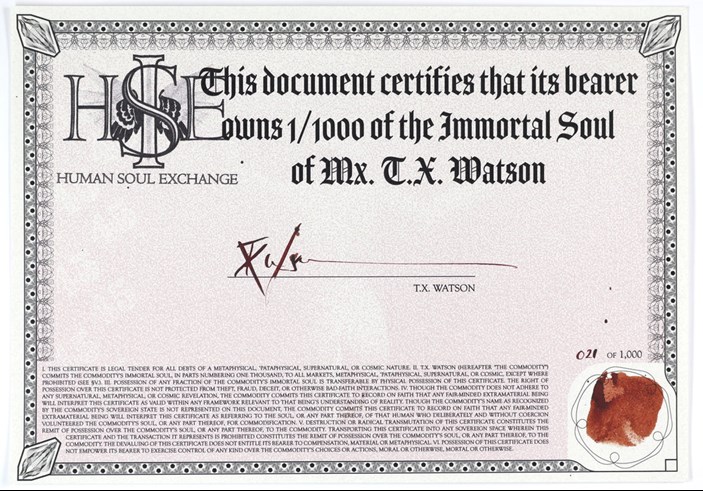
Back in Michelangelo’s day an artist might find a wealthy patron to support both their profession and their finances; with the invention of the crowdsourcing website Patreon artists can now ask fans to support their work through tiered donations or a subscription-based service...
The artist’s dilemma has always been how to make money while creating. Back in Michelangelo’s day an artist might find a wealthy patron to support both their profession and their finances; with the invention of the crowdsourcing website Patreon artists can now ask fans to support their work through tiered donations or a subscription-based service; but T.X. Watson, a student mired in the study of Memetics, decided to sell their soul. (Watson asked that I use the non-gendered singular “they” when referring to “them” in the article.)
Watson is a recent graduate of Hampshire College where they studied art and philosophy and accumulated $45,000 of student debt. Watson has some options when repaying student loans: they could pay roughly $100 a month for the next 25 years which will steadily increase and means paying double the amount borrowed; or they could pay closer to $500 a month for ten years and pay roughly 1.5 times the amount initially borrowed; or they could apply for income-based plans, potentially pay nothing, and owe the money forever. Each option feels like a trap requiring that students sell their souls to corporations in order to lose their debt.
For years, Watson has been trying to find a way to equalize the monetary needs of society, and stumbled upon a Memetic project as a potential source of assistance, “Selling my Soul.” Memetics is, in Watson’s own words: “The study of ideas in an evolutionary framework,” meaning how ideas change over time and especially how ideas are communicated to the public (TV, radio, Internet, etc.). “I enjoy finding the right way to express an idea whatever medium that takes me to,” Watson says.
Because the project focuses on anti-capitalism, the artwork Watson sells comes in the form of a certificate, which they refer to as similar to a bank note or stocks and bonds. They sign and fingerprint every certificate that sells, but “I’m going to avoid having more than 50 or so signed, that way if somebody comes and steals the box they haven’t gotten my whole soul.”
Watson is not religious. They feel closest to Apatheist, “A belief system in which the question of God is irrelevant,” they say. Basically, Watson believes that if they live life with the best of intentions, treating others fairly and acting in accordance with their own views, then they’ll end up wherever they’re destined, whether it’s good enough for God or not.
At $45 apiece, Watson needs to sell 1,000 shares (or certificates) in order to pay off their accumulated student loans of $45,000. But it’s less like a handout and more like an investment as with any business. At first, they told listeners that if Watson became well known the value of the certificate would heighten, making the certificates highly salable. After giving it some thought, Watson realized that a better pitch would have been to tell listeners that if the “Selling my Soul” certificates ever went viral then the originals would be worth a lot and could be resold at whatever cost the future owner desires.
Plenty of students have tried different things to pay off their loans: Some have found work as brand ambassadors selling corporate products through school and social media; others go after the quick experimental jobs that promise thousands of dollars with no work, but can’t guarantee human safety; and still others abandon all material comforts to find a job on the road that offers food and shelter in addition to cash. Watson would prefer to repay their loans without selling their soul (or health) in these unconventional ways.
Watson wants to make a difference in this world: they’re currently interning for an Amherst-based global workers rights organization. But how can you make a difference when you’re tied down by student debt? By July, Watson had sold 17 shares amounting to $765, but that leaves 983 shares to reach their goal. In May, Watson posted to a Tumblr account: “Please, help me sell my soul to you folks so I don’t have to sell it to some corporation.”

The certificates were designed primarily on the computer:
Written by Artemis Savory

ArtDependence Magazine is an international magazine covering all spheres of contemporary art, as well as modern and classical art.
ArtDependence features the latest art news, highlighting interviews with today’s most influential artists, galleries, curators, collectors, fair directors and individuals at the axis of the arts.
The magazine also covers series of articles and reviews on critical art events, new publications and other foremost happenings in the art world.
If you would like to submit events or editorial content to ArtDependence Magazine, please feel free to reach the magazine via the contact page.